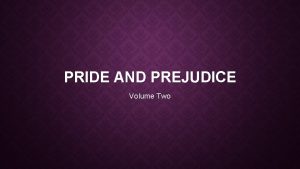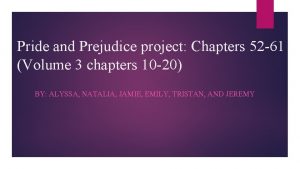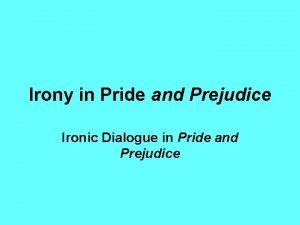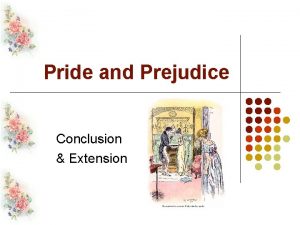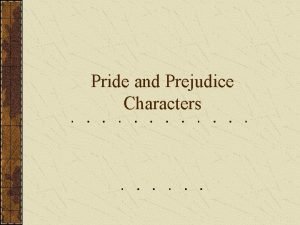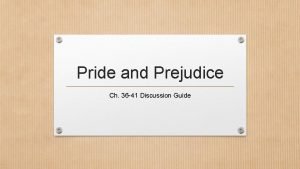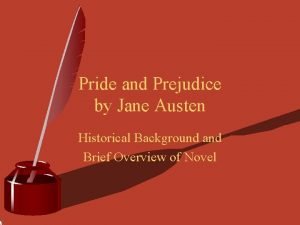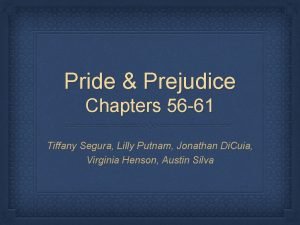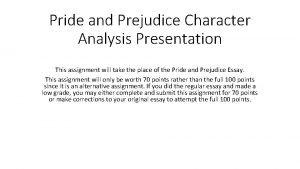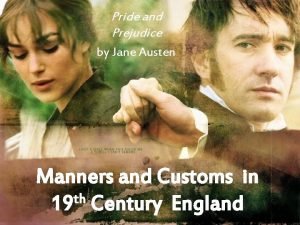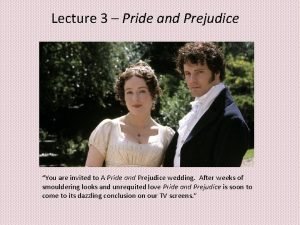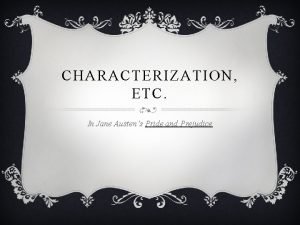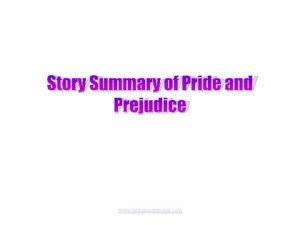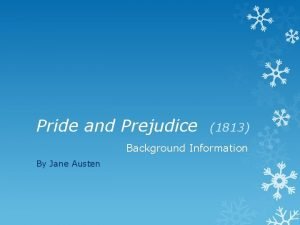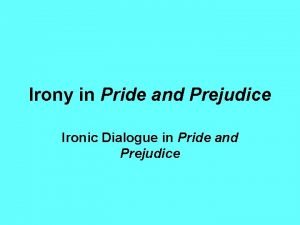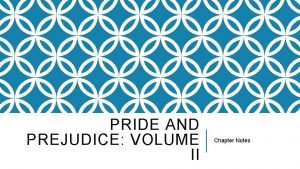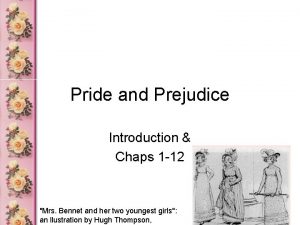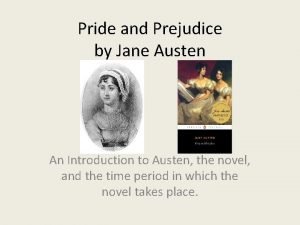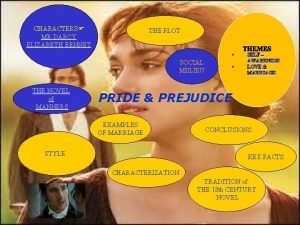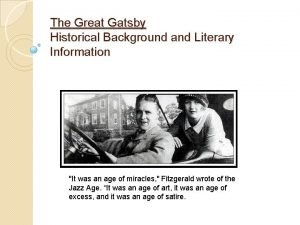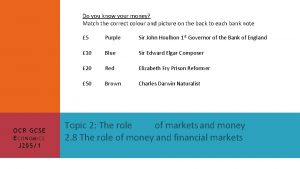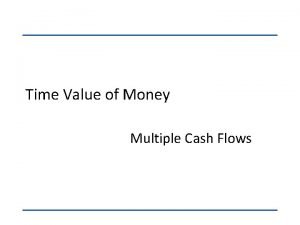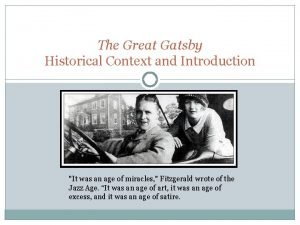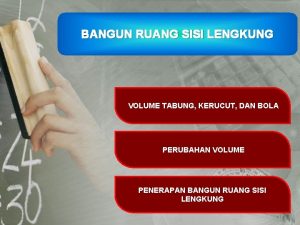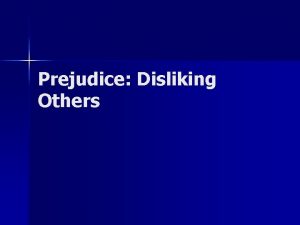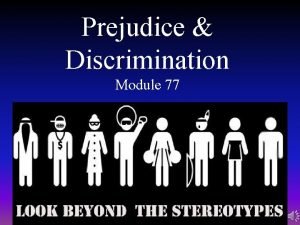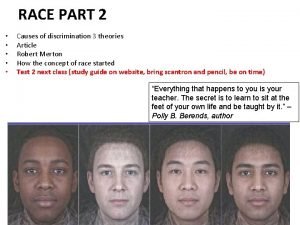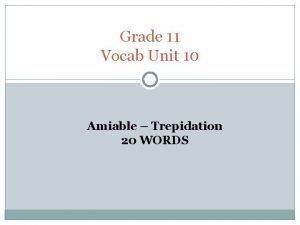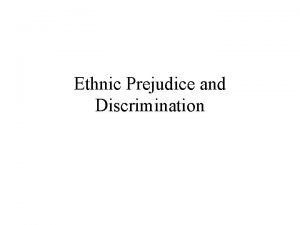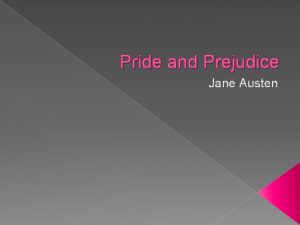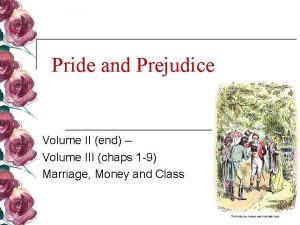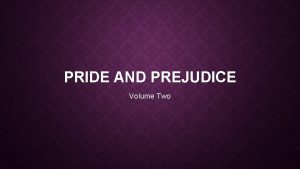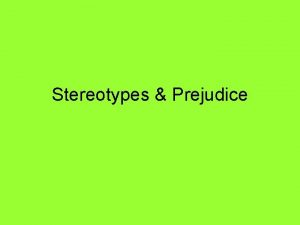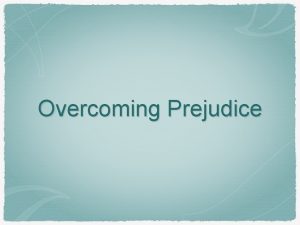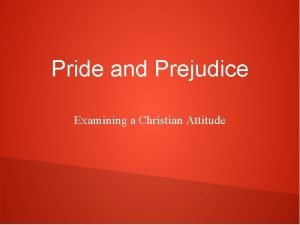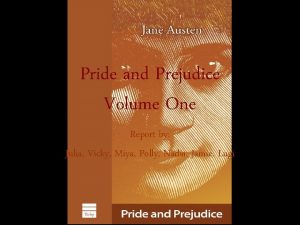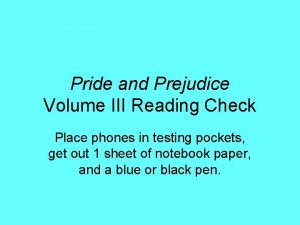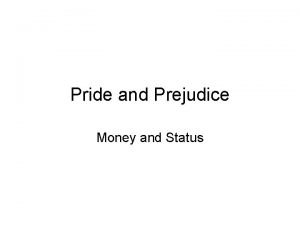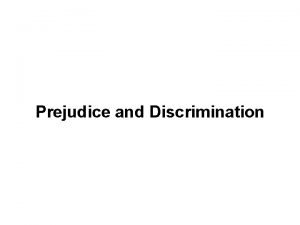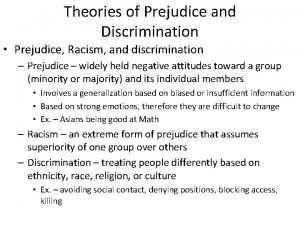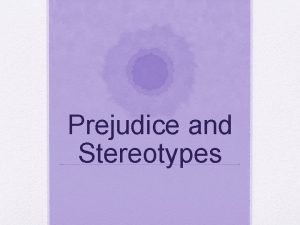Pride and Prejudice Volume II nMarriage Money and









































- Slides: 41

Pride and Prejudice Volume II n(Marriage) -- Money and Class n. Class – Burlesque n. Education – Three Bennet Sisters’ Trips

OUTLINE n n n Plot Summary General Questions Class Distinction: Mrs. Gardiner, Sr. Lucas, Lady Catherine Class, Money and Burlesque Education: q q q 1. Jane’s Trip and her Responses 2. Elizabeth’s Education –on Charlotte; Wickham and Darcy 3. Lydia’s Trip

Plot Summary n n n Volume I: 3 balls (Meryton, Lucas Lodge, Netherfield), 3 spouse-seeking attempts (Jane’s stay at N, Collins’ proposal, trips to Meryton [Wickham’s story]). 2 attempts failed; prejudice established and communication failed. Volume II: visits and letters class distinction & education (Volume III: three marriages)

Plot Summary (2) Volume II: visits and letters class distinction & education 1 -3 Jane London Not meeting Mr. B Jane’s and Charlotte’s letters 4 - 15 Eliza Hunsford & Rosings Meeting Darcy by chance Darcy’s letter 16 – 23 Eliza Pemberley Lydia Brighton Jane’s letters

General Questions n n n Aren’t we also easily deceived by appearance, or misled by prejudices? How do money, family and class background determine our character and influence our decision to marry? What does it mean to be educated, cultivated or “accomplished”?

Class Distinction (1): the Gardiners Chap 8: Mrs. Hurst on Jane: “But with such a father and mother, and such low connections, I am afraid there is no chance of it [Jane’s being well-settled]. '' ``I think I have heard you say, that their uncle is an attorney in Meryton. '‘ The Philips ``Yes; and they have another, who lives somewhere near Cheapside. '‘ The Gardiners ``That is capital, '' added her sister, and they both laughed heartily. ``If they had uncles enough to fill _all_ Cheapside, '' cried Bingley, ``it would not make them one jot less agreeable. ''

Class Distinction (1): the Gardiners II: Chap 2: Eliza on the Gardiners’ residence: “Mr. Darcy would no more suffer him to call on Jane in such a part of London -- ! My dear aunt, how could you think of it? Mr. Darcy may perhaps have heard of such a place as Gracechurch Street, but he would hardly think a month's ablution enough to cleanse him from its impurities, were he once to enter it. (109)

Class Distinction (1): the Gardiners II: Chap 2: (108) Mr. Gardiner -- a sensible, gentlemanlike man Mrs. Gardiner -- an amiable, intelligent, elegant woman. “The Netherfield ladies would have had difficulty in believing that a man who lived by trade, and within view of his own warehouses, could have been so well bred and agreeable. ”

Class Distinction (2): Sr. Lucas -- admires aristocracy, is agreeable to all; emptyheaded -- chap 5: his knighthood "had given him a disgust to his business and to his residence in a small market town; and quitting them both, he had removed with his family to a house about a mile from Meryton, . . . where he could think with pleasure of his own importance, and, unshackled by business, occupy himself solely in being civil to all the world. “ -- awed by L. Catherine (124 -25); echoes Collins’ words of praise

Class Distinction (3): Lady Catherine -- Her appearance prepared for by Mr. Collins’ frequent mentioning and Ms. De Bourgh (122). -- Only Eliza is not frightened 125; -- 125 authoritative and selfimportant; -- nosy: intrude into Charlotte’s domestic affairs (126); a most active magistrate in her own parish (130); Intrude into C Fitzwilliam’s discussion with Eliza (133 - ) -- snobbish (e. g. discussion of piano playing 133)

Class Distinction, Money and Marriage n n Although Lady Catherine and those admiring/flattering upper classes (Collins, Sr. Lucas, the Philips, etc. ) are ridiculed, class distinction matters for Darcy and disadvantages Jane and Eliza: “given up on” by two possible spouse choices: q q n Wickham –p. 111 "affection" for Wickham would be "so very imprudent" because of his "want of fortune. " Colonel Fitzwilliam (the younger son of an earl) p. 141 -"there are not many in my rank of life who can afford to marry without some attention to money. ". One charade by Austen here: http: //www. pemberley. com/janeinfo/pptopic 2. html#monmarr 1

Class and Burlesque Collins and Lady Catherine

Burlesque詼諧詩文;滑稽劇 n Literary work, film, or stage production that mocks a person, a place, a thing, or an idea by using wit, irony, hyperbole, sarcasm, and/or understatement. For example, a burlesque may turn a supposedly distinguished person into a buffoon ( 丑角 ) or a supposedly lofty subject into a trivial one. A hallmark of burlesque is its thoroughgoing exaggeration, often to the point of the absurd. Cervantes used burlesque in Don Quixote to poke fun at chivalry and other outdated romantic ideals. Among English writers who used burlesque were Samuel Butler (Hudibras) and John Gay (The Beggar’s Opera). Burlesque is a close kin of parody. The latter usually ridicules a specific literary work or artistic production. (source)

Collins –What’s Funny about him? n n n Manners overdone – apologize for 15 mins; praising every piece of furniture when he visits the others. His words “pompous nothings. ” not a sensible man – outright stupid, completely ignorant of how people react to him. (proposal and self-introduction to Darcy) Self-contradictory – pride + obsequiousness. e. g. II: Chap 15 pp. 164 -65.

Lady Catherine – What’s Funny about her? a control addict– e. g. II: 6 p. 125 -26 “She enquired into Charlotte's domestic concerns familiarly and minutely, and gave her a great deal of advice as to the management of them all; told her how every thing ought to be regulated in so small a family as her's, and instructed her as to the care of her cows and her poultry. ” e. g. II: p. 130 “though this great lady was not in the commission of the peace for the county, she was a most active magistrate in her own parish, the minutest concerns of which were carried to her by Mr. Collins; and whenever any of the cottagers were disposed to be quarrelsome, discontented or too poor, she sallied forth into the village to settle their differences, silence their complaints, and scold them into harmony and plenty. ” e. g. astonished when E does not let her know her age. p. 128 n

Lady Catherine – What’s Funny about her? n n n Self-important to an extreme: II: Chap 8 p. 133 - on music “I must have my share in the conversation. . . ” II: Chap 15 p. 161– “I believe nobody feels the loss of friends so much as I do. ” “They were excessively sorry to go!”

Education and Judgment Related Topics: Accomplishment & Performance

Education in late 18 th and early 19 th Century England n n n less "respectable" mode of education: Church-run schools and apprenticeship Genteel male children: taught at home by their parents and governesses, or went off to a private boarding school or to live with a tutor. Women: educated at home, besides going to masters to learn skills such as piano playing. (source with a "charade“ on women’s housework. )

What is education composed of? 1. Social Expectation n A Lady’s accomplishment: VIII p. 29 q q q n Binley -- "They all paint tables, cover skreens, and net purses“; C. Bingley – “music, singing, drawing, dancing, and the modern languages”; Darcy -- improvement of her mind by extensive reading A governess – p. 127 “No governess! How was that possible? Five daughters brought up at home without a governess! -- I never heard of such a thing. Your mother must have been quite a slave to your education. ''

2. Social Behavior // Performance n n n Eliza’s singing performance –more natural than Mary’s. I: chap 6 I: Chap 18: when discussing with Darcy on their a-social behavior: ``I must not decide on my own performance. '' II: Chap 8 p. 135 compare “lack of practice” in social manners to piano performance.

What is education composed of? 3. Careful Judgment & Temperance Careful Judgment vs. First Impressions n Temperance -- III: Chap 15 Darcy: “As a child I was taught what was ‘right’, but I was not taught to correct my temper. I was given good principles, but left to follow them in pride and conceit. ” n

Jane –Her Kindness and Repressed Emotion n n to Ms. Bingley's 1 st letter – feels bad about not being liked. the Darcy-Wickham controversies –withhold judgment (e. g. 107) to Bingley's absence – (104; nothing to blame him with) (105 - 06; fancied admiration; Ms. Bingley must wish her brother happy wants to take it “in the best light. ” 106) to Charlotte's marriage: a “most eligible’ match in terms of fortune; she has respect for Collins. (*104 -105 Her discussion with E; who do you agree with more? )

Jane –Her Kindness and Repressed Emotion In London: 1) not hearing from C. Bingley, who lies about not receiving her letter; 2) not warmly received by C; 3) Got a cold visit –p. 114: E proves right, C does not care for Jane and is partial to Ms. Darcy. n q q Pity her; There seems to be duplicity in her manners, but Jane banishes such painful thought. – Jane does feel depressed p. 118 ; chap 10—p. 140 (Jane’s letters) chap 11: 144. Still loves Bingley – E. meeting Jane Chap XVII 173

Elizabeth’s “Education” A Continuous Modification of her Judgment and Self-Understanding

Elizabeth – her education A lot more opinionated and judgmental than Jane, but she can be wrong (re. Bingley, Wickham and Charlotte); n Mrs. Gardiner & The Wickham episode stop E & W for “the want of fortune” 111 -12 her playfulness & cynicism in chap 24 & chap 27 (119) n At Rosings: her lack of “proper” education by governess discussed 127 n

On Charlotte n n n Charlotte “disgraces herself and has sunk in her esteem”, because for her Charlotte has "sacrificed every better feeling to worldly advantage“ (chap 22 p. 97). Elizabeth "persuaded that no real confidence could ever subsist" between her and Charlotte again; "all the comfort of intimacy was over“ (98). As Hunsford: Charlotte’s composure 122; her room at the back, facing backwards 129 P. 165 pities Charlotte, but Charlotte "had chosen it with her eyes open. ” Charlotte’s better judgment (of Darcy’s partiality to E): Chap 9 p. 139

On Wickham n n Chap 18: Is not changed in her view of W by Ms. Bingley or Charles Bingley. After he turns his attention to Ms. King, “the most agreeable man”: “He must always be her model of the amiable and pleasing. ” 117 Compared him with C. Fitzwilliam: “though, in comparing them, she saw there was less captivating softness in Colonel Fitzwilliam's manners, she believed he might have the best informed mind. ” (139) Darcy’s letter (II: chap 12)

On Wickham (2) Eliza’s reflections: n 1) realizes that she doesn't objectively know much in his favor except for his "pleasing countenance". n 2) Chap 13: Elizabeth now struck by impropriety of his disclosures and inconsistency of his verbal professions with his actions. n Chap 18: a fresh source of displeasure: Elizabeth is not pleased when he returns his attentions to her after Mary King has left town, considering that he had turned from Elizabeth to Mary King when the latter had inherited £ 10, 000. n Re. Darcy: ``Oh, no!'' said Elizabeth. ``In essentials, I believe, he is very much what he ever was. '' n Chap 17: Discussion with Jane, and their decision not to tell others. P. 152

On Darcy n E. does not know of Darcy’s growing attraction to he Darcy Elizabeth gaze Finds it critical; At the Lucas’: Finds her attractive ``Mr. Darcy is all politeness. '' At Netherfield: the danger of paying Elizabeth too much attention. Elizabeth: -- ``Implacable resentment is a shade in a character. But you have chosen your fault well. -- I really cannot laugh at it; you are safe from me.

On Darcy n Their Witty Exchanges at Netherfield & Netherfield ball show their affinity to each other Darcy & Elizabeth Netherfield on letter writing, humility as a kind of pride Bingley’s concern for friendship & his changefulness; Darcy's 2 nd dance invitation; On Darcy's 2 nd dance invitation Netherfield On dance manners, book and “their” ball unsocial taciturn disposition"

Elizabeth/Darcy dislogue at Rosings E’s blindness to Darcy’s Emotional Attachment n E D to frighten me? Understands that she does not mean it the 1 st ball; Not friendly to strangers Piano playing as a metaphor for lack of practice//rusty social manners. neither performs for strangers (p. 135)

Elizabeth/Darcy dislogue -II: Chap 8 p. 135 on piano playing & social manners n [Lady Catherine – constant practice] n [I do not play well] “because I would not take the trouble of practising. It is not that I do not believe my fingers as capable as any other woman's of superior execution. '' n Darcy smiled, and said, ``You are perfectly right. You have employed your time much better. No one admitted to the privilege of hearing you, can think any thing wanting. We neither of us perform to strangers. '‘

Elizabeth/Darcy over Jane and Bingley n n Two reasons: lack of 1) proper connections; 2) sense; Actual reasons: 1) this “worst” kind of pride; 2) retaining Mr. Bingley for his sister.

Darcy’s Proposal n n n Why is the proposal not presented directly? (as a contrast to Collins’ proposal, and the letter presented directly laterv? ) Darcy: eloquent on the subject of tenderness; concluded with representing to her the strength of that attachment which he cannot conquer. Focuses on E’s feelings of being offended: q q q The family obstacles; she could easily see that he had no doubt of a favourable answer. Elizabeth’s responses: pp. 145 -48. get angrier upon hearing Darcy’s response.

Darcy’s Letter 1. on Jane’s matter: p. 151 n – Jane’s indifference acknowledges his error; n connection; n “total want of propriety” of the family 152 2. Wickham p. 153

Elizabeth’s Responses to Darcy’s Letter n n n 1 st response 156 Re-reading it. P. 157 reflect on Wickham 15759; Self-knowledge p. 159 Read it the third time: Jane’s feeling little displayed. More reflections p. 163 q q She doesn’t get carried away and fall in love with him right away. Self-criticism Her family Concern for Jane

Elizabeth – in the aftermath of the letter n n n Needs to talk to Jane to unload her secrets; P. 172 Acknowledges her own prejudices but still confirms her wit. Can be humorous at this point.

Lydia’s Trip Its beginning and her expectation

Lydia and Kitty Catherine and Lydia: q like company 9; at the Meryton ball, they are “never without partners, which was all that they had yet learnt to care for at a ball. ” q like to go the Meryton, instead of going to visit Jane when she is sick. q Ignorant, idle and vain; supported by their mother. (II. chap 14— 163) “Catherine, weak-spirited, irritable, and completely under Lydia's guidance, had been always affronted by their advice; and Lydia, self-willed and careless, would scarcely give them a hearing. ” Lydia: q tallest 6; q High animal spirits 33 q Calls Mary King “a nasty little freckled thing” (168)

Lydia –lack of understanding and communication n Concerned only with fun and marriage: q q q n To Jane: “Lord, how ashamed I should be of not being married before three and twenty!” (II. Chap 16: 168) misery "extreme" as the militia regiment is about to leave Meryton. (II. Chap 18: 175); In “restless ecstasy” when Lydia is invited by MRs. Forster letters—short to Mrs. B; to Kitty though rather longer, were “much too full of lines under the words to be made public. ” (182)

Elizabeth’s persuasion and the father’s negligence n n pp. 176 - 77 Lydia in danger of becoming "a flirt in the worst and meanest degree of flirtation. . . -- Vain, ignorant, idle, and absolutely uncontrolled!".
 Pride and prejudice volume 2
Pride and prejudice volume 2 Pride and prejudice chapter 60 summary
Pride and prejudice chapter 60 summary Jane eyre chapter 18 summary
Jane eyre chapter 18 summary Irony pride and prejudice
Irony pride and prejudice Locations in pride and prejudice
Locations in pride and prejudice Pride and prejudice conclusion
Pride and prejudice conclusion Sir lucas kids in pride and prejudice
Sir lucas kids in pride and prejudice Pride and prejudice chapter 41 summary
Pride and prejudice chapter 41 summary Pride and prejudice background
Pride and prejudice background Pride and prejudice chapter 49 summary
Pride and prejudice chapter 49 summary Chapter 56 pride and prejudice
Chapter 56 pride and prejudice Character analysis of pride and prejudice
Character analysis of pride and prejudice Etiquette and manners
Etiquette and manners Pride and prejudice lecture
Pride and prejudice lecture Indirect characterization in pride and prejudice
Indirect characterization in pride and prejudice Pride and prejudice summary
Pride and prejudice summary Pride and prejudice background information
Pride and prejudice background information Ironic dialogue
Ironic dialogue Jane eyre pride and prejudice
Jane eyre pride and prejudice Pride and prejudice chapter 30 summary
Pride and prejudice chapter 30 summary Introduction of pride and prejudice
Introduction of pride and prejudice Pride and prejudice introduction
Pride and prejudice introduction Pride and prejudice plot diagram
Pride and prejudice plot diagram Money money money team
Money money money team Jordan baker golf
Jordan baker golf Money smart money match
Money smart money match Money on money multiple
Money on money multiple Context of great gatsby
Context of great gatsby Tom buchanan character traits
Tom buchanan character traits What is the volume of blood pumped per minute
What is the volume of blood pumped per minute Stroke volume normal
Stroke volume normal Solute vs solvent
Solute vs solvent Closing volume vs residual volume
Closing volume vs residual volume Volume tabung kerucut
Volume tabung kerucut Large volume parenteral
Large volume parenteral Nature and power of prejudice in social psychology
Nature and power of prejudice in social psychology Prejudgement vs prejudice
Prejudgement vs prejudice Allport's scale of prejudice
Allport's scale of prejudice Merton's typology of prejudice and discrimination
Merton's typology of prejudice and discrimination Vocab unit 10
Vocab unit 10 Prejudice
Prejudice Bias for in favor of
Bias for in favor of
